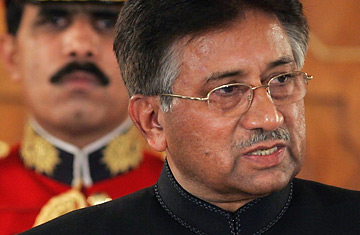
President Pervez Musharraf speaks after taking the oath of office for a five-year term as a civilian President November 29, 2007 at the presidential palace in Islamabad, Pakistan.
Just a few hours after having been sworn in for a second five-year term as President of Pakistan, Pervez Musharraf addressed the nation, saying that because of his declaration of emergency rule on November 3 "the democratic process is continuing... we have won lots of success against terrorism."
He finished his short speech by announcing the lifting of emergency rule on December 16. Since emergency was declared 26 days ago, Pakistan's constitution has been suspended, the Supreme Court dismissed and thousands of lawyers, human rights activists and opposition leaders detained. Citing a conspiracy to "derail the democratic process" by the judiciary and the media, Musharraf defended the emergency, saying "that because of these measures the country is back on the path to democracy."
The December 16 date for lifting the emergency, though seemingly arbitrary, is in fact a not-so-subtle threat to opposition parties and the ambitions of former Prime Ministers Benazir Bhutto and Nawaz Sharif. Sharif and his party favor boycotting the elections, while Bhutto is leaning toward participating. Now, Musharraf has given each of them a deadline. "The 15th is the last day for the withdrawal of nomination papers" says Ahsan Iqbal, a spokesman for Sharif's Pakistan Muslim League Nawaz Party, referring to the last date the candidates can formally withdraw from the race. That may be enough to force both Bhutto and Sharif to commit to the election and thus justify Musharraf's claim "that I have fulfilled the promise of bringing democracy" back. Says Iqbal, "If [the government is] sure there is no boycott then they will lift the emergency" — hinting at the opposition belief that Musharraf could still extend the emergency if one of the candidates commits to a boycott.
Sharif's party, along with a consortium of some 31 other parties (though not Bhutto's) has decided "in principle" to boycott the elections unless Musharraf reinstates the Supreme Court. (Many Pakistanis feel that Musharraf's real target during the emergency was an increasingly independent Supreme Court that threatened to declare his recent election as President invalid.) Since he returned from exile last Sunday, Sharif has been adamant that the restoration of Pakistan's Supreme Court is paramount. "The victim of the emergency was the judiciary," says Iqbal. "Therefore lifting emergency is only as good as surrendering a weapon of murder. It is not compensation for the crime."
Iqbal says that before a formal decision to boycott is made, the Muslim League will consult with Benazir Bhutto and her popular Pakistan People's party. "We must make an attempt to bring Benazir Bhutto in, we must invite her to join for solidarity. We need a unified stand." But so far, that unity seems far from guaranteed. Bhutto's spokesman Farhatullah Babar has indicated that she would participate in the election "under protest," as opposed to a full boycott. If Bhutto goes ahead, Sharif will have no choice but to follow, for fear of being cut out of any future government. And so, even as a civilian, Musharraf still seems to have the upper hand.
